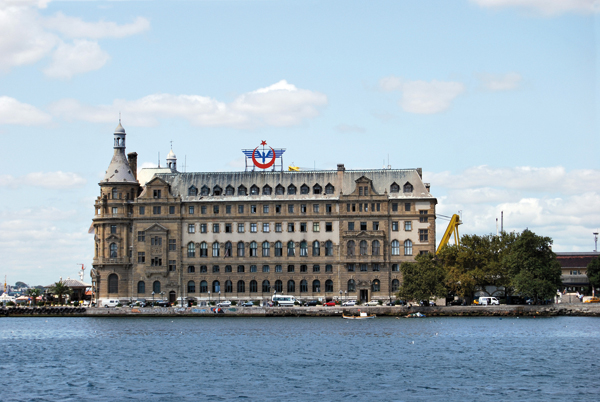Built as a gift to Sultan Abdulhamidu II from the German Kaiser Wilhelm II in 1908, the Haydarpaşa Station now serves as one of the major tourist attractions in Istanbul. It is remarkable in two ways. Firstly, with carved pillars, textured sandstone and stained glass windows, it resembles a castle. Secondly, it is surrounded by water on three of its sides and, therefore, built on wooden piles.
CASTLE-LIKE DESIGN
Designed by two German architects, Otto Ritter and Helmut Conu, the station merges traditional German and Neo-Renaissance architectural styles in its U-shaped, sandstone-textured form. The elements that especially catch the eye of tourists are: the slated, steep pitched roof, circular towers on the two corner points of the building, as well as the impressive marble steps that lead one in, thereby allowing him or her to explore an equally interesting interior space. Wide hallways and high ceilings both create an airy and spacious feel.
In addition, the walls ornamented with various geometric figures and flower patterns make for an exceptional atmosphere.
WATER ALL AROUND
Undoubtedly, a unique feature of the Haydarpaşa Station is that it is built on the base of 1100 timber piles, each 21 meters long, driven deep into the seabed by a steam hammer. The construction is said to be very strong and stable, and consequently resistant to damages caused by various natural disasters, such as earthquakes. At the same time, it offers spectacular views of the surrounding water.

© serdarerenlere – Fotolia.com
FIRES AND EXPLOSIONS
Unfortunately, this splendid building was substantially damaged during three dreadful events. First, in 1917, as a result of sabotage during World War I, the ammunitions stocked in the building exploded, destroying the roof and several sections of the station. In 1979, due to an explosion of an oil tanker just off the mole in front of the station, the historical stained glass windows were broken. Finally, in 2010, a fire swept through the building, again destroying much of the roof and rendering it in dire need of restoration.
RESTORING THE STATION TO ITS FORMER GLORY
Currently, the Haydarpaşa Station, a famous landmark in Istanbul, is slowly being restored to its former glory. It is clear that it means much more than just another terminus for the train.
Magdalena Marcinkowska
GLOSSARY:
miss one’s connection –nie zdążyć się przesiąść
delayed train – opóźniony pociąg
to complain – narzekać
railway station, train station – dworzec kolejowy
memorable – niezapomniany
gift – prezent, dar
remarkable – niezwykły
carved – wydrążony, rzeźbiony
textured sandstone – o fakturze piaskowca
stained glass – szkło witrażowe
surrounded by – otoczony
pile – tu: pal
to merge – łączyć
to catch one’s eye – przykuwać uwagę, wzrok
slated –łupkowy
steep-pitched – stromy
circular – okrągły
marble – marmurowy
interior, interior space – wnętrze
hallway – korytarz
ceiling – sufit
airy – przestronny i widny
pattern – wzór
undoubtedly – niewątpliwie, bez wątpienia
to drive into sth (syn. to hammer into sth) – wbijać
seabed – dno morskie
steam hammer – młot parowy
stable – trwały, stabilny
resistant to – odporny na
earthquake – trzęsienie ziemi
substantially – znacznie
stocked – składowany, magazynowany
mole (syn. breakwater) –tu: falochron
to sweep through – ogarniać
dire need of – pilna potrzeba
to restore sth to its former glory – przywrócić czemuś dawną świetność
terminus – stacja końcowa




